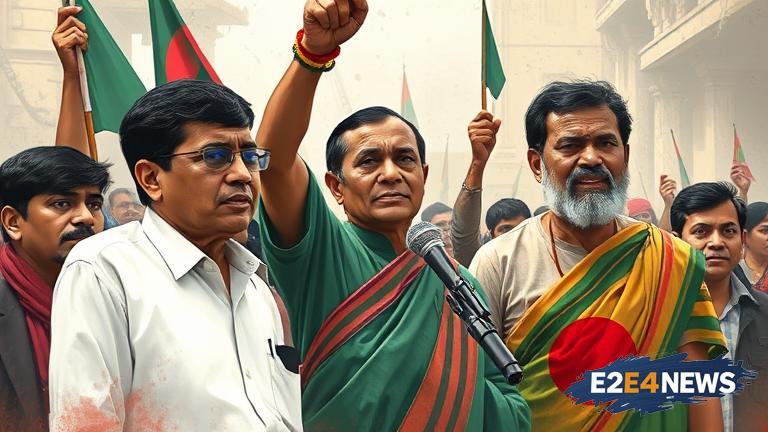The Awami League, a prominent political party in Bangladesh, has strongly condemned the Yunus-led interim government for its failure to address the growing issue of minority persecution in the country. The party’s criticism comes amidst reports of increasing violence and intimidation against minority groups, including Hindus, Christians, and Buddhists. The Awami League has accused the interim government of being ineffective in protecting the rights of minority communities and has called for immediate action to be taken to prevent further violence. The party’s leaders have expressed concern about the rising trend of minority persecution, which they believe is a threat to the country’s secular and democratic principles. The interim government, led by Yunus, has been facing criticism from various quarters for its handling of the situation. The government has been accused of being slow to respond to the needs of minority communities and of failing to provide adequate protection to them. The Awami League has demanded that the government take concrete steps to address the issue of minority persecution and to ensure that the rights of all citizens are protected. The party has also called for the establishment of a special task force to investigate cases of minority persecution and to bring perpetrators to justice. The issue of minority persecution has been a longstanding concern in Bangladesh, with many minority groups facing discrimination and violence. The country’s minority communities have been subjected to various forms of persecution, including forced conversions, land grabbing, and physical attacks. The Awami League has pledged to work towards creating a more inclusive and tolerant society, where the rights of all citizens are respected and protected. The party has also called for greater international cooperation to address the issue of minority persecution, which it believes is a global concern. The criticism from the Awami League has sparked a heated debate about the role of the government in protecting minority rights. Many have argued that the government has a responsibility to ensure that the rights of all citizens are protected, regardless of their religious or ethnic background. Others have argued that the government’s failure to address the issue of minority persecution is a result of its own biases and prejudices. The issue of minority persecution has also sparked concerns about the country’s human rights record. Bangladesh has been criticized by various international organizations for its poor human rights record, including its treatment of minority groups. The country has been accused of failing to protect the rights of its citizens, particularly those from minority communities. The Awami League’s criticism of the interim government has been seen as a positive step towards addressing the issue of minority persecution. The party’s call for greater action to be taken to protect minority rights has been welcomed by many, who believe that it is essential for creating a more inclusive and tolerant society. However, others have argued that the party’s criticism is not enough and that more needs to be done to address the issue. The issue of minority persecution is a complex one, with many factors contributing to it. The Awami League has recognized that addressing the issue will require a multifaceted approach, involving both short-term and long-term solutions. The party has pledged to work towards creating a more inclusive and tolerant society, where the rights of all citizens are respected and protected. The party’s leaders have expressed concern about the rising trend of minority persecution, which they believe is a threat to the country’s secular and democratic principles. The Awami League has demanded that the government take concrete steps to address the issue of minority persecution and to ensure that the rights of all citizens are protected. The party has also called for greater international cooperation to address the issue of minority persecution, which it believes is a global concern. The criticism from the Awami League has sparked a heated debate about the role of the government in protecting minority rights. Many have argued that the government has a responsibility to ensure that the rights of all citizens are protected, regardless of their religious or ethnic background. Others have argued that the government’s failure to address the issue of minority persecution is a result of its own biases and prejudices. The issue of minority persecution has also sparked concerns about the country’s human rights record. Bangladesh has been criticized by various international organizations for its poor human rights record, including its treatment of minority groups. The country has been accused of failing to protect the rights of its citizens, particularly those from minority communities. The Awami League’s criticism of the interim government has been seen as a positive step towards addressing the issue of minority persecution. The party’s call for greater action to be taken to protect minority rights has been welcomed by many, who believe that it is essential for creating a more inclusive and tolerant society. However, others have argued that the party’s criticism is not enough and that more needs to be done to address the issue. The issue of minority persecution is a complex one, with many factors contributing to it. The Awami League has recognized that addressing the issue will require a multifaceted approach, involving both short-term and long-term solutions. The party has pledged to work towards creating a more inclusive and tolerant society, where the rights of all citizens are respected and protected. The party’s leaders have expressed concern about the rising trend of minority persecution, which they believe is a threat to the country’s secular and democratic principles. The Awami League has demanded that the government take concrete steps to address the issue of minority persecution and to ensure that the rights of all citizens are protected. The party has also called for greater international cooperation to address the issue of minority persecution, which it believes is a global concern.





